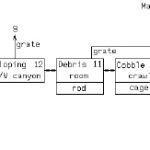critical ecologies
Review of Heather Houser’s Ecosickness in Contemporary U.S. Fiction: Environment and Affect
In this review of Heather Houser’s Ecosickness in Contemporary U.S. Fiction, Sharalyn Sanders identifies the hopeful potential for environmental justice via contemporary literature. Finding a solidarity implied between intersectional identities and ecocriticism, Sander’s finds in Houser’s call for “scholarly activism” an antidote to the detachment which threatens to thwart environmental awareness.
The Peripheral Future: An Introduction to the Digital and Natural Ecologies Gathering

In this introduction to her gathering on Digital and Natural Ecologies, Lisa Swanstrom pulls back from the tendency towards apocalyptic speculation that is commonplace in popular discourse of technology and nature. Instead, Swanstrom offers a more grounded discourse that addresses the impact of the digital on the natural.
Nature is What Hurts
In this review of Timothy Morton's Hyperobjects, Robert Seguin contemplates the implication of the text's eponymous subject on art, philosophy, and politics. The "hyperobject," a hypothetical agglomeration of networked interactions with the potential to produce inescapable shifts in the very conditions of existence, emerges as the key consideration for the being in the present.
Cave Gave Game: Subterranean Space as Videogame Place

Jerz and Thomas identify our fascination with natural cave spaces, and then chart that fascination as it descends into digital realms, all in order to illustrate the importance of "the cave" as a metaphor for how we interact with our environment.
#clusterMucks: Iterating synthetic-ecofeminisms

In the course of examining a number of key concepts in New Materialism, eco-criticism, and feminist philosophy, Melanie Doherty delves into Jamie Skye Bianco's digitally generated "postnature writing." Doherty's rich knowledge of contemporary ecofeminist debates helps to contextualize Bianco's hybrid performance-based works that draw upon a database of philosophical texts and landscapes, like the Salton Sea and Dead Horse Bay, that have been marred by histories of human misuse.